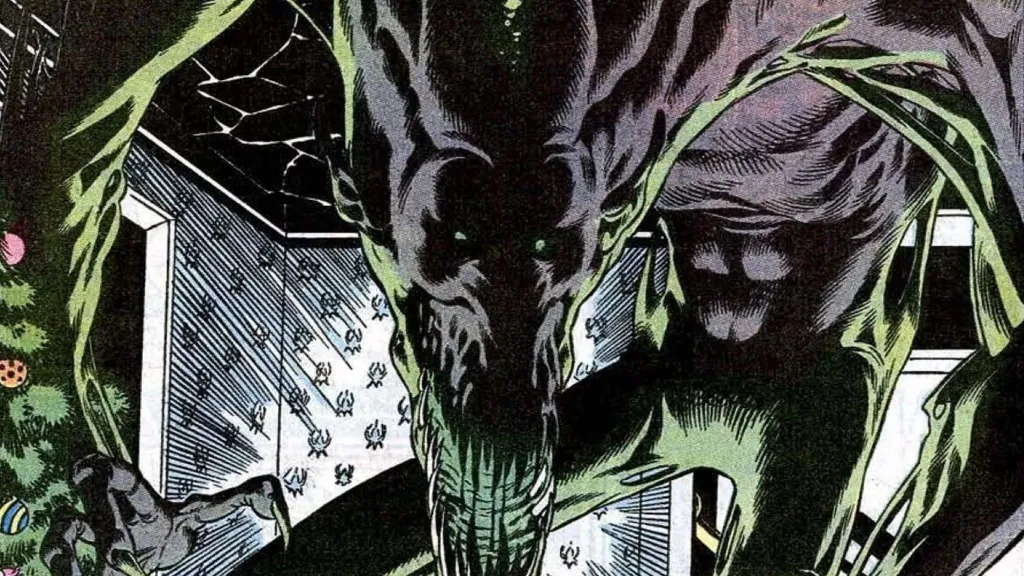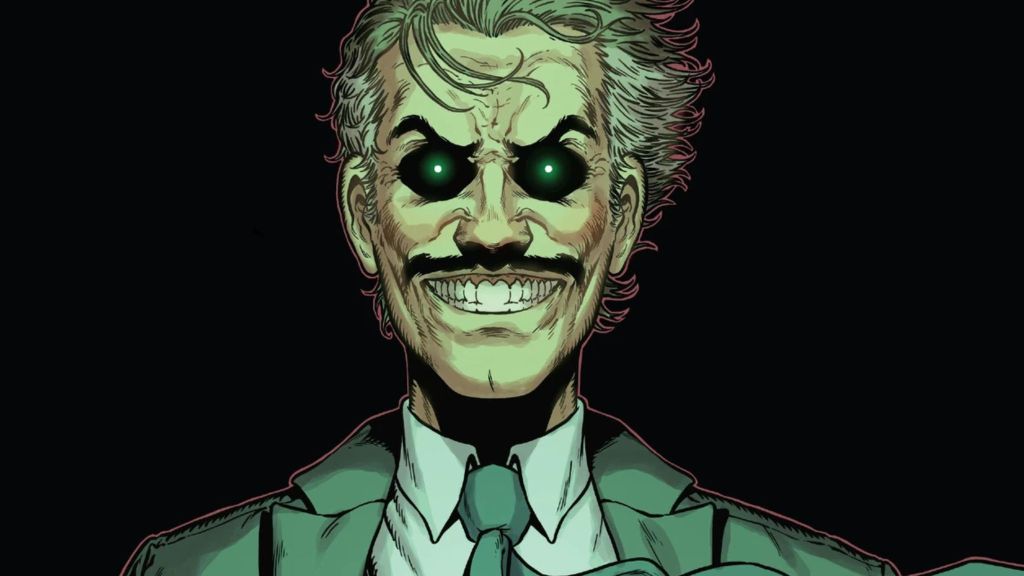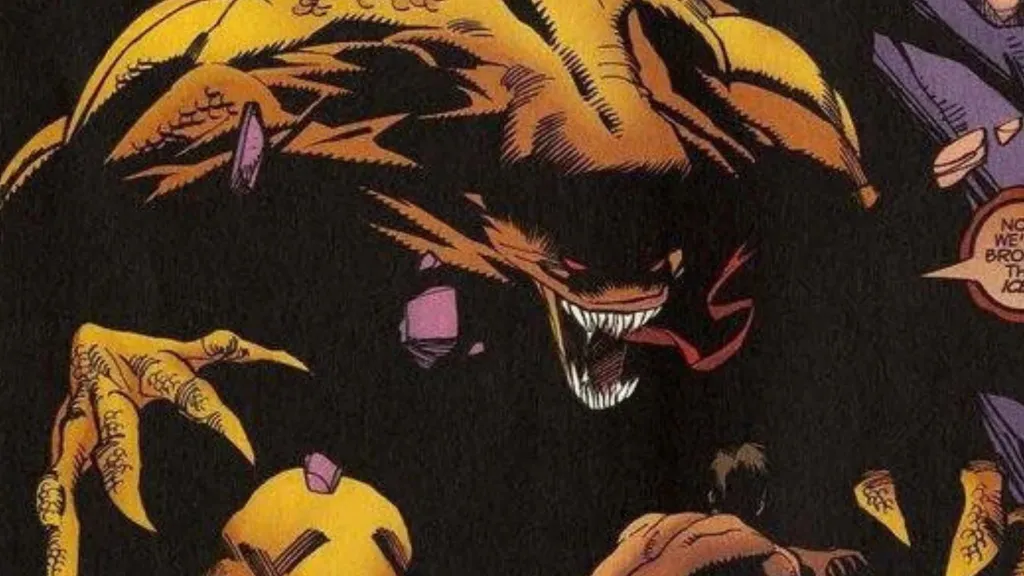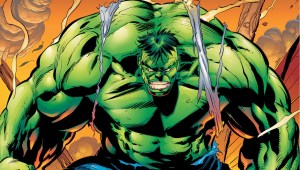Unlike most superhero foes, Hulk’s enemies often come from within, manifesting as fractured aspects of Bruce Banner’s psyche or the lingering scars of his horrific childhood. Villains like the Devil Hulk and even his abusive father Brian Banner explore Bruce’s mental health, forcing him to confront the worst parts of himself.
Videos by ComicBook.com
Sadly, you’ll probably never see these versions in the MCU. Disney’s cinematic formula favors spectacle and humor over the existential horror that defines Dark Hulk arcs. Where the comics dive into psychological horror, theology, and self-ruin, the MCU treads carefully to maintain broad appeal. Adapting Devil Hulk or Maestro would mean confronting Banner’s mental illness, his anger as trauma rather than just “smash energy.” That’s heavy, risky storytelling.
3. The Guilt Hulk

The Guilt Hulk is one of the most unsettling and symbolically rich manifestations of the Hulk’s fractured psyche. Introduced in Incredible Hulk #377 (1991), the Guilt Hulk is the embodiment of Banner’s self-loathing, trauma, and remorse — particularly surrounding his mother’s murder at the hands of his father, Brian Banner. Where the Savage Hulk channels childhood innocence and the Grey Hulk expresses cunning cruelty, the Guilt Hulk represents pure psychological torment.
Bringing him into the MCU would mean leaning heavily into realistic depictions of child abuse, psychological breakdowns, and generational guilt — territory far too heavy for Marvel’s current tone and PG-13 comfort zone. Personally, I think the Guilt Hulk could be one of the most powerful additions to any adaptation — not because of his strength, but because of what he represents. He’s the horror of unresolved pain. Until Marvel risks turning the Hulk into a gothic psychological horror story, the Guilt Hulk will remain what he’s meant to be — a nightmare confined to the pages of Bruce Banner’s mind, and the comics bold enough to venture there.
2. Brian Banner

Every monster needs an origin — and in Bruce Banner’s case, that monster wasn’t created by gamma radiation, but by his father. In the comics, Brian Banner was a brilliant physicist whose genius was poisoned by paranoia and resentment. He believed that exposure to radiation had corrupted his genes, and when Bruce was born, he projected that fear onto his son — convinced the boy was some kind of “inhuman mutation.” What follows is some of Marvel’s most disturbing material: years of emotional and physical abuse, culminating in the murder of Bruce’s mother, Rebecca.
Bruce’s suppressed memories of his father’s abuse come back to haunt him throughout his life, and in some storylines, Brian even returns as a literal ghost or a psychological manifestation of Bruce’s trauma, further tormenting him. While there have been hints of Bruce’s troubled past (like his line about attempting suicide in The Avengers), the franchise has shown little interest in exploring his mental health in-depth. Introducing Brian Banner would require a significant shift in tone and focus, pulling the Hulk away from his role as a smashing powerhouse and into a deeply psychological narrative. It’s a fascinating story, but one that doesn’t fit neatly into the MCU’s action-packed, quippy formula. So, while Brian Banner will likely remain in the shadows of comic lore, his presence is still felt every time the Hulk rages.
1. The Devil Hulk

First appearing in Incredible Hulk #13 (Vol. 2, 2000), the Devil Hulk was born from Bruce’s suppressed resentment — the personality that hates humanity for how it’s treated him. Unlike the Savage Hulk, who reacts emotionally, or the Grey Hulk, who schemes with ego, the Devil Hulk plots with purpose. He believes he was meant to rule, and that only by tearing down humanity can Bruce find peace.
In the Immortal Hulk series, this persona evolved into a deeply chilling figure. He becomes a twisted protector of Bruce, claiming to act in his best interest by tearing down everything and everyone who has hurt him. His methods, however, are apocalyptic — he’s not afraid to destroy the world to give Bruce a fresh start. Devil Hulk is too abstract and philosophical for mainstream audiences. He isn’t a physical villain that Bruce or the Avengers can fight in a traditional sense. He exists entirely within Bruce’s mind, representing his suppressed emotions and darkest impulses. While comic fans appreciate the complexity of a villain that is essentially Bruce’s own worst self, casual viewers might struggle to connect with such an introspective concept. The MCU thrives on external threats — villains like Loki, Ultron, or Thanos, who can be visually represented and battled on-screen. The Devil Hulk, as a psychological and existential threat, doesn’t fit that mold.
While the MCU has had morally complex villains (like Killmonger or Thanos), it ultimately leans toward stories of hope, redemption, and teamwork. The Devil Hulk’s dark worldview and his willingness to destroy everything for Bruce’s sake make him feel more like a character from a horror movie than a superhero blockbuster. For now, he’ll remain a villain too dark and twisted for the MCU to handle.









